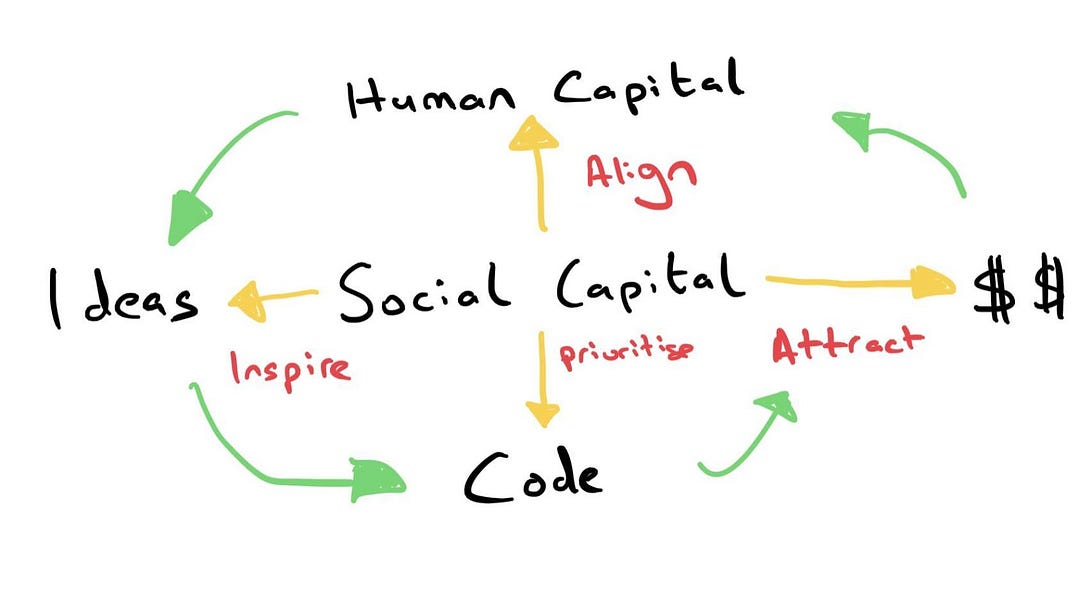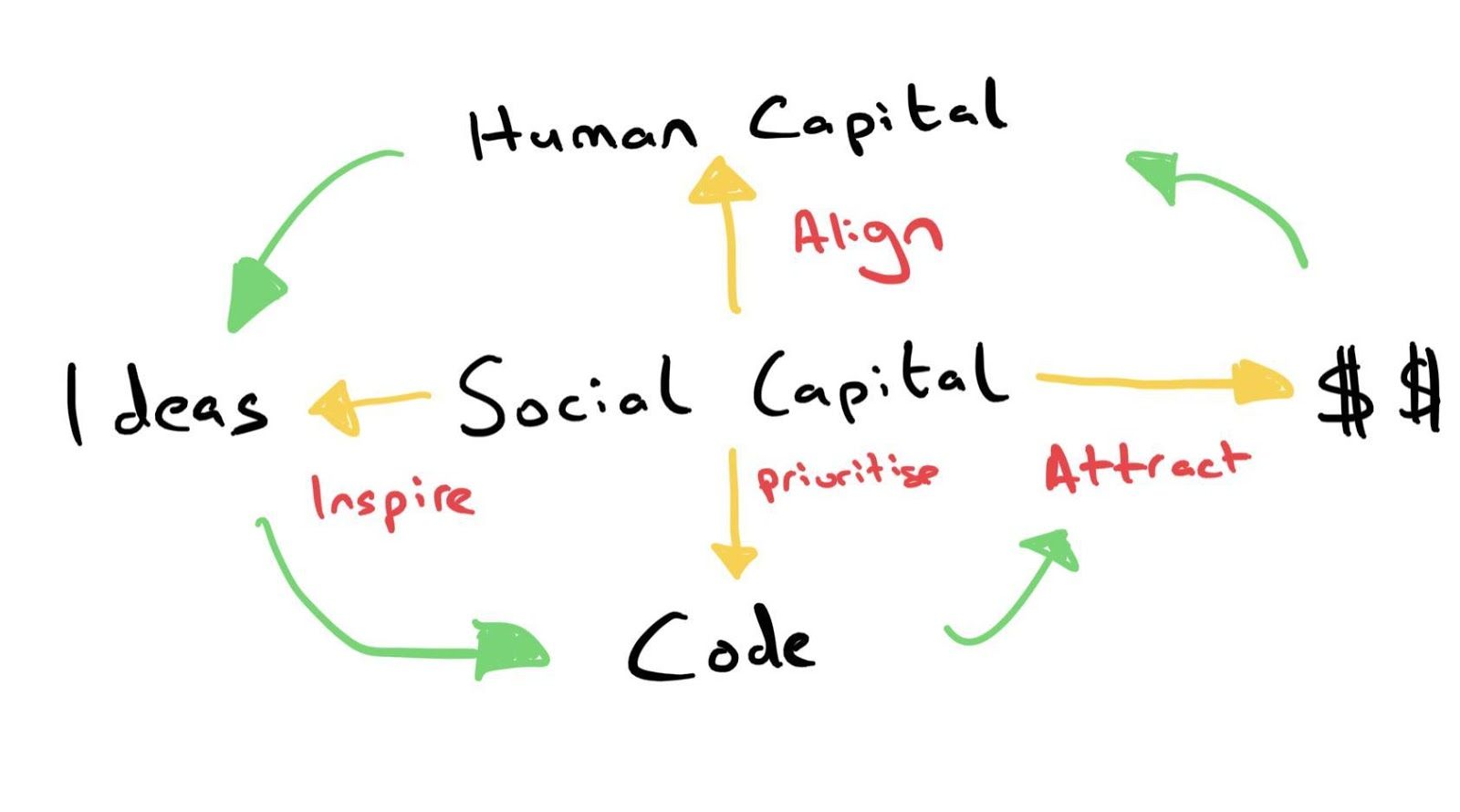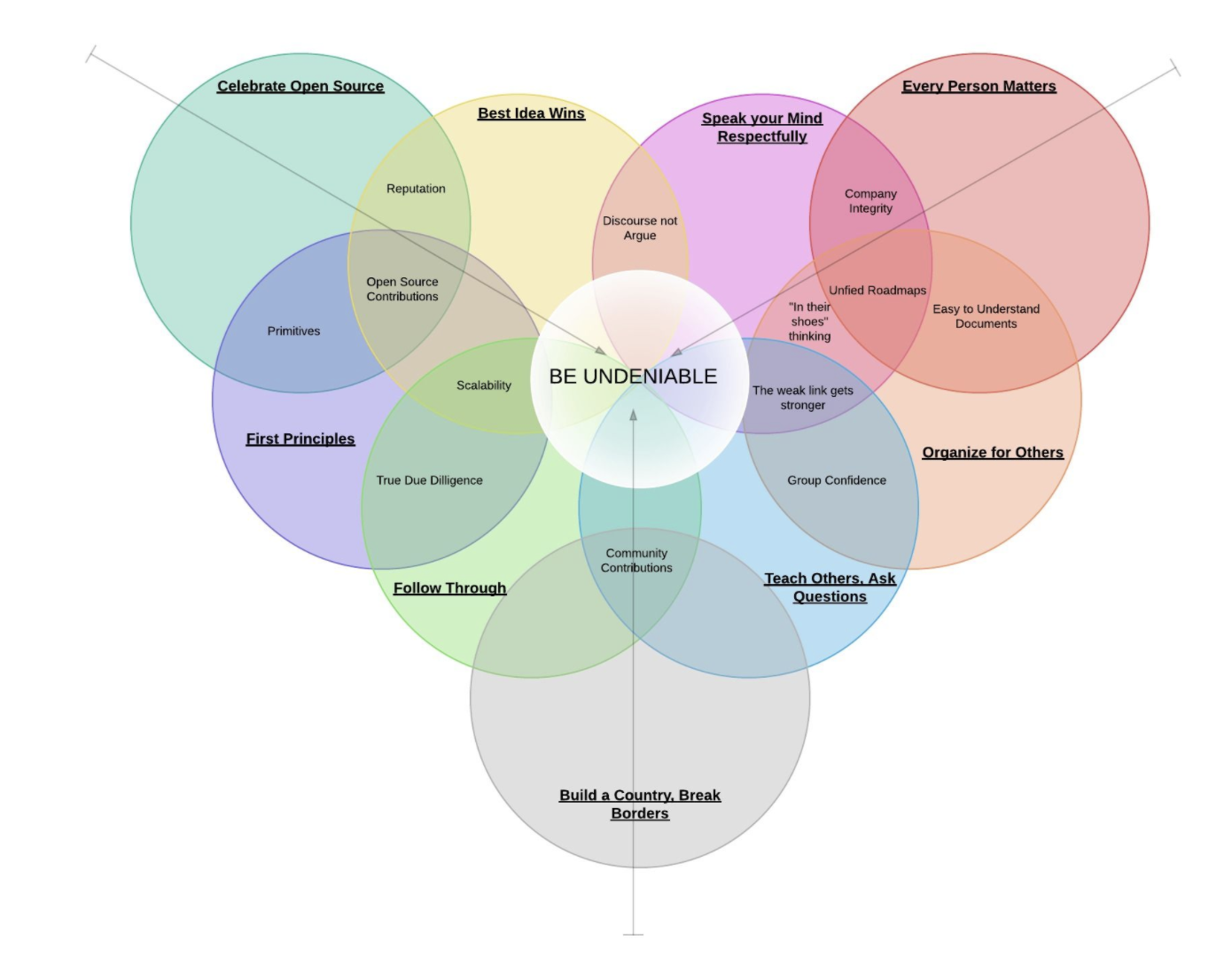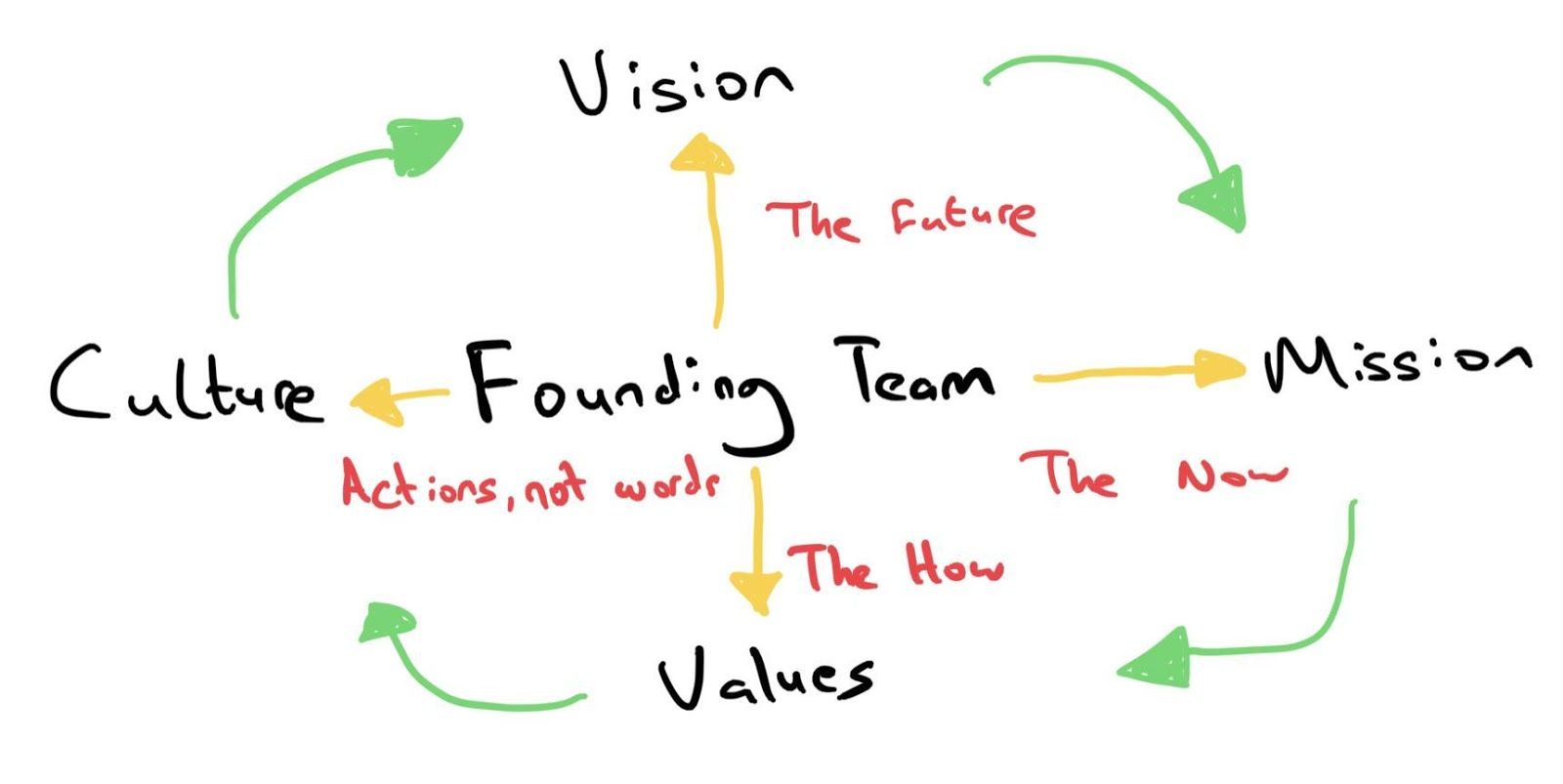Culture eats capital for breakfast

Dear Bankless Nation,
What allows BTC to hold its 21m cap?
An algorithm yes. But what keeps the algorithm from changing?
The culture and values of the Bitcoin network.
I believe culture and values are two of the most under-appreciated aspects of crypto networks. These form a different type of capital. Social capital.
If crypto networks want to succeed in building a sustainable, decentralized protocol, crypto founders and early teams need to be clear about these values.
They need to set the culture.
Today’s piece dives into the importance of social capital for crypto networks.
If you’re a crypto founder, read this a few times over—it’ll be crucial for the success of what you’re building.
Because you’re not just building an app…you’re building culture.
And culture eats capital for breakfast.
- RSA
THURSDAY THOUGHT
Guest Writer: Dermot O’Riordan, Partner at Eden Block
Social Capital in the 21st century
“...even a billion dollars of capital cannot compete with a project having a soul.”
Vitalik Buterin, December 2020
Crypto networks are getting increasingly better at attracting financial capital (TVL and investment) as well as human capital (developer activity).
But what about their social capital?
Social capital, the shared values that allow individuals to work together in a group to achieve a common purpose, is much more underdeveloped and is largely undefined for most crypto networks.
In Descartes’ Error: Emotion, Reason, and the Human Brain, neuroscientist Antonio Damasio describes a revolutionary discovery he made: people with damage to the part of their brain where emotions are made can’t make decisions. They could describe what they should do in logical terms but couldn’t decide.
In other words, humans use logic to reason themselves towards a decision, but emotion governs our actual decisions. In this sense, engaging a speculator’s fear of missing out on a hot new project is a valid argumentative technique. It may be more effective than arguing over technical trade-offs on Twitter. At the same time, price-focused arguments are also limited in scope (this is unlikely their sole motivating drive), short-termist, and uncalibrated. And they also produce negative second-order effects such as a culture of greed and anti-intellectualism.
Can we do better?
I believe so.
Value can act as the catalyst that sparks greater coordination and innovation in crypto networks. They can act as the light that guides us across the chasm to mainstream adoption of ten million-plus daily active crypto users.
Let’s look at the role of values in crypto networks and how founders can define, embed, and leverage values for their crypto startup’s success. Note: The terms crypto networks and crypto startups are used interchangeably throughout.
Social capital, why it’s important
Jim Collins’ research for his book “Good to Great” covered 1,435 companies across 30 years. One of the takeaways was that “markets, technology, competition, or products” weren’t the distinguishing factors that separated “an enduring company of iconic stature” from the others. What matters most is for companies to: “discover [their] core values and purpose beyond just making money (core ideology) and [to] combine this with the dynamic of preserve the core / stimulate progress.”
There are two parts to the argument for the explicit development of culture and values within crypto networks.
First, the “DeFi summer” earlier this year demonstrated the power of incentives for bootstrapping new networks with both capital and users. That said, given we still have only 500,000 daily active users across the entire Ethereum ecosystem, extrinsic values that appeal to our base desires to get rich will only get us so far. Crypto networks need to compete more effectively with web2 technology and financial competitors on a values-basis for capital and users.
Second, crypto networks’ owner-operator co-operative model makes them uniquely differentiated compared to their centralized competitors. Open source code is brought to life through a network of supply-siders, users, speculators, developers, and general enthusiasts. However, to survive and thrive, stakeholders in these crypto networks need to be aligned around how such networks adapt and evolve. Core guiding principles create better alignment between stakeholders, in turn, enabling greater coordination and, ultimately, sustainability through effective governance.
To summarize, values are necessary to attract capital and users away from competitors and align stakeholders. Attracting new users to opt-in to the new crypto paradigm, and opt-out of the status quo is the starting point. Aligning all stakeholders is the game changer that should enable crypto networks to coordinate and govern effectively at scale.

Credibly authentic value systems
It is argued that “markets are a complex consensus mechanism that does not respond well to human intervention because it introduces subjectivity.” While blockchain systems shouldn’t sacrifice their credible neutrality through inserting subjective values directly into the markets they enable, values can guide priorities on what to build and deciding how to deal with trade-offs when building them, and importantly, how to govern the new shared public infrastructure that blockchain systems offer to the world.
Vision > Mission > Values
Values in the context of a crypto network describe what’s important to the stakeholders concerning how it operates, the world around it with which it interacts, its contractors, and the unique constituents of its network; supply-siders and demand-siders, developers, investors, and any other stakeholders that they choose to explicitly value or give recognition to in their guiding principles.
Every organization’s values are framed by its vision, the promised land, the world it wants to contribute to creating, and the mission, it’s measurable ambition and what it does to achieve its vision.
For example, the vision of the stakeholders driving decentralized infrastructure platform Pocket Network is to build “censorship-resistant technology to lay the foundation for reorganizing the world’s existing structures to be prepared for a more fair, hyper-connected, interplanetary future.”
And their mission is to “create a sustainable, decentralized ecosystem for blockchain infrastructure through open source, permissionless products & services that empower the community and its participants.”
Pocket Network’s values are defined internally as follows:

However, their values, as stated above, are currently only used internally to guide the team and close contractors. On this note, Pocket is similar to most other crypto startups who are on the pathway to full decentralization as they do not yet explicitly define its values and culture externally (apart from through its constitution, which is referred to later in this article).
Conversely, every crypto startup implicitly defines its value and culture externally through its every action or inaction.
For example, the values of a crypto network include decisions around how information is disseminated and what is and isn’t shared to a network’s community (transparency), how team and foundation tokens are vested and sold (alignment), how conflicts are managed (integrity), how work is prioritized (progress), how new code gets accepted and who can contribute (community), how funds are allocated (sustainability), and so on.
As put by Ben Horowitz, “Culture is how we do things round here… [and] [i]f you don’t methodically set your culture, then two-thirds of it will end up being accidental, and the rest will be a mistake.”
Values and progressive decentralization
The general need to hire a team, raise funds, ship code, onboard initial users, and build a community before a network can be sufficiently decentralized creates a chicken-and-egg problem. Jesse Walden’s progressive decentralization playbook is a good starting point for thinking through the risks and tradeoffs involved at each stage of a crypto startup’s development. Still, until a network is sufficiently decentralized, virtually all of the power within a network resides with only a handful of people that constitute the founding team.
Inherent to progressive decentralization is the move away from the reliance on omnipotent founding leaders. Well-developed values provide a framework for making the right decisions and taking the right actions in unforeseen situations when founders are no longer around. Consequently, well-developed values should accelerate a crypto startup’s journey through the stages of progressive decentralization.
Further, explicit core values should enable greater alignment on big decisions that the founding team may make in the interim period until the network reaches a sufficient decentralization point.
For example, would a more developed vision, mission, and values for Compound have helped the backlash from announcing plans to launch an application-specific blockchain outside of the Ethereum ecosystem?
What about Maker Dao’s decision to accept centralized collateral such as USDC?
Or the potential ramifications for the Bitcoin community’s adherence to a fixed supply of 21 million in the face of the network’s future security requirements?
Culture: Turning values into an operating system
“Like insects and other hive-minded critters, we build super-organisms in the shape of families, companies, communities, countries, and cultures. We feed these greater abstractions with our labor and dedication. Brick by brick, we construct social machines that persist in populations, and thereby derive their power from a social footprint. Not an individual one.”
Lex Sokolin, November 2019
The DeFi ecosystem aims to overcome the incumbent global financial system. Yet while many denounce insider dealing and fraud in traditional financial markets, what efforts have any DeFi communities made to prevent insider dealing or fraud in their own markets? What kind of activities or behaviors have some of us been complicit in that you wouldn’t accept outside of the crypto ecosystem? Are we living the values you mean to espouse? How much do our values matter?
When you are not consciously aware of the culture you have inherited or unwittingly created, you run the risks of second and third-order effects you never expected. The core thesis of the book, “Why Nations Fail: The Origins of Power, Prosperity, and Poverty” is that extractive systems will continue to spit out the same outputs no matter what the inputs are (e.g. a new ruling class) unless its entire cultural operating system is overturned.
Builders should be conscious about the aspects of the existing financial and technological systems that they seek to replicate. Otherwise, they risk becoming like the revolutionaries documented in Why Nations Fail who end up becoming as corrupt as the leaders they replaced. On a similar note, Durant laments that “nothing is clearer in history than the adoption by successful rebels of the methods they were accustomed to condemn in the forces they deposed.”
While the code that operates your smart contracts may be credibly neutral, your culture that governs how the stakeholders in your ecosystem interact may not. This is an issue that will only be exacerbated as your network scales, causing edge cases to magnify and problems to compound over time.
Based on years of research and interviews with leaders from around the world, Bretton Putter argues in “Own your Culture” that a strong culture is one where the values, mission, and vision are:
- Understood, clearly defined, and documented.
- Demonstrated and reinforced continuously.
- Lived by leadership and the entire team.
- Managed and evaluated regularly.
- The lens through which decisions are evaluated and made.
Bretton provides a three-step process for culture: 1) define it; 2) embed it; 3) manage it.
1. Define

Formulating the vision, mission, and values starts with the founding team. Agree on your mission and vision, and articulate some values that you aspire for your crypto startup to strive for.
Clearly articulating your values should enable you to attract the right developers, users, investors, and community members, who match your values and care about your mission. Interestingly, Jim Collins’ research didn’t reveal any specific “right” core values for becoming an enduring company.
A key finding of his study was that “core values are essential for enduring greatness, but it doesn’t seem to matter what those core values are.” As no one value defines success, you should discover what works for your community—just make sure the values you choose are authentic. Paying lip service to advocated values is one of the most self-sabotaging ways to undermine a culture; you must live your values to give them meaning and show the world you can be trusted to bring your vision to life.
As the leader of a decentralized global community, you must document your vision, mission, values, and other unwritten or implied elements of the way you want your community to work together. Your community will not be able to learn osmotically about your culture in the same way as office-based traditional startups.
Putting everything in writing allows everyone connected to, or potentially interested in, what you’re building to collaborate on your vision, mission, and values, and suggest improvements. For example, Wikipedia’s “Neutral Point of View”—a key community reference document—runs to almost 4,500 words. Wikipedia is
2. and 3. Embed, then monitor and adapt
Embedding your community values requires standard bearers to lead by example, starting with the founding team.
Questions to be asked early on, include but are not exclusive to the following: are community open-source contributors treated like second-class citizens, or are they treated as equals? Can community members help shape and steer project strategy, initiatives, and tools or must they wait for the core team to set an example?
Transparency in crypto networks touches upon team vesting and selling of tokens, conflicts, development updates, and roadblocks; virtually every scenario where there exists an information asymmetry between the insiders and the wider community. Transparency embodies honesty, respect, open and timely communication, and authenticity. As a result, these values enable trust and cooperation, which, in turn, should impact and inspire employees and community members alike.
To encourage adoption of your values, you should seek to recognize them, and reward them where possible, whether through public shout outs in your community channels, or community NFTs, gamification, general SWAG, contributions to documentation, and so on.
As your community starts to grow, it’s likely time to think about whether your vision, mission, and values are still fit for purpose. If not, review and refine. Change is good.
Just make sure to be transparent and try to be fair.
Once your culture is embedded, particularly once your crypto startup is no longer yours but the community’s, it is up to the broader community to manage it and improve it. To avoid a tragedy of the commons scenario, the community shouldn’t be simply left to their own devices. Think about how to monitor your culture and values, and share this information with your community. This will enable the community to continue to review the vision, mission, and values, and understand the current value of the community’s social capital.
Taking this further, a crypto network’s values should be incorporated directly into the governance system to form the lens through which decisions are evaluated and made.
For example, Pocket’s constitution contains eight binding guiding principles, ranked in order of priority from credible neutrality to consensual collaboration. Decisions made by Pocket Network’s DAO “must be made according to their furtherance of the Principles” and can be challenged using Aragon Court in the case of non-compliance.
The Pocket team still needs to square their internal values (shown above in “Vision > Mission > Values”) with their constitutional values as part of their progress along their journey to full decentralization and community transparency.
In Yearn, anyone in the community can make proposals, radical ideas are considered and the process is largely decentralized, notwithstanding Andre’s soft power. On the other hand, in Compound, the core team, investors, and a select group of core community members suggest proposals with a very formal process for votes being passed or rejected.
Then there are examples like Uniswap with no clear community culture or governance structure (yet), with a lack of clarity as to how open the core team is to community participation.
We need lots of experimentation before any culture playbook for decentralized systems can be established. None of these approaches to community engagement and governance are necessarily better than each other. What matters is that you as a builder are conscious of the decisions you make for your community.
Incentives + Values FTW
In the context of permissionless systems, values facilitate two key outcomes:
- Kickstart your Bat Signal: Similar to how some argue Bitcoin to be the Flag of Technology; every crypto network needs to articulate its unique values to appeal to a more significant cause. Remember, your startup is a movement. You need to draw attention to like-minded potential new users and enable them to more easily opt-in to the new crypto paradigm and out of the status quo.

- Create alignment and enable progressive decentralization: Clearly stating your values gets everyone rowing at the same speed and in the same direction; as they say, culture eats strategy for breakfast. Values alignment can manifest itself in helping to prioritize developer time and capital allocation. While your governance system is not fully set out, alignment amongst your community is important for them to feel that decisions are fair and in line with what they signed up for when they invested their time or money into the network.

Ongoing research into decentralized reputation systems will have a part to play in how values are embedded and recognized at scale.
There is a vast potential for founders to marry powerful articulations of their startup’s significance to the world—in terms that appeal to our inner instincts and not just our voices of reason—with the cooperative model that crypto systems uniquely enable.
Crypto’s new set of tools for incentivizing and rewarding participation is synergistic to an opt-in model driven by values alignment. When combined, it is a potent recipe for global coordination and alignment.
The future is bright for those conscious about their approach.
Thanks to Bretton Putter, Jack Laing and Nelson Ryan for their input and guidance when drafting this piece!
Disclosure: Eden Block is an investor in Pocket Network.
Nothing contained herein constitutes investment, legal, tax or other advice nor is to be relied upon in making an investment or other decision.This presentation contains the opinions of the author and such opinions are subject to change without notice. Furthermore, it may also include data and opinions derived from third party sources. Eden Block does not accept liability for the accuracy or completeness of any such information or opinions which can be subject to change without notice.
Action steps
- Identify the values and culture within your favorite crypto network
- Recognize how these values will drive the direction of the network in the future
Author Bio
Dermot O'Riordan is a Partner at Eden Block, a research-led European venture capital firm specializing in blockchain technology and web3 ecosystems.